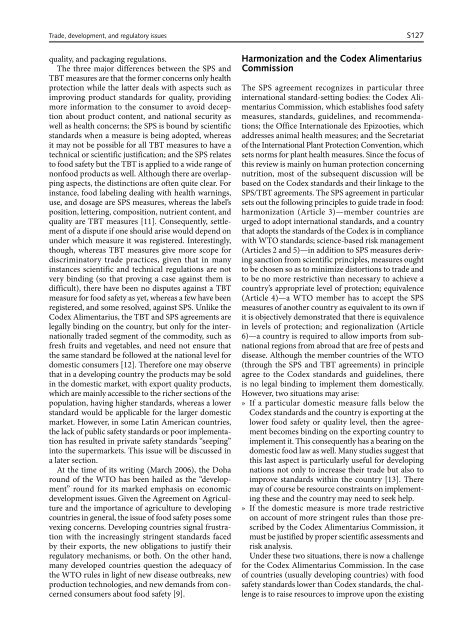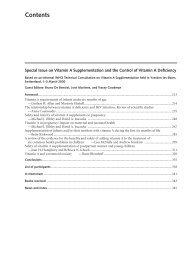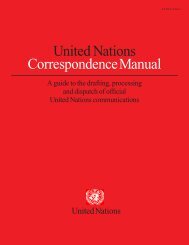Implementing food-based dietary guidelines for - United Nations ...
Implementing food-based dietary guidelines for - United Nations ...
Implementing food-based dietary guidelines for - United Nations ...
Create successful ePaper yourself
Turn your PDF publications into a flip-book with our unique Google optimized e-Paper software.
Trade, development, and regulatory issues<br />
quality, and packaging regulations.<br />
The three major differences between the SPS and<br />
TBT measures are that the <strong>for</strong>mer concerns only health<br />
protection while the latter deals with aspects such as<br />
improving product standards <strong>for</strong> quality, providing<br />
more in<strong>for</strong>mation to the consumer to avoid deception<br />
about product content, and national security as<br />
well as health concerns; the SPS is bound by scientific<br />
standards when a measure is being adopted, whereas<br />
it may not be possible <strong>for</strong> all TBT measures to have a<br />
technical or scientific justification; and the SPS relates<br />
to <strong>food</strong> safety but the TBT is applied to a wide range of<br />
non<strong>food</strong> products as well. Although there are overlapping<br />
aspects, the distinctions are often quite clear. For<br />
instance, <strong>food</strong> labeling dealing with health warnings,<br />
use, and dosage are SPS measures, whereas the label’s<br />
position, lettering, composition, nutrient content, and<br />
quality are TBT measures [11]. Consequently, settlement<br />
of a dispute if one should arise would depend on<br />
under which measure it was registered. Interestingly,<br />
though, whereas TBT measures give more scope <strong>for</strong><br />
discriminatory trade practices, given that in many<br />
instances scientific and technical regulations are not<br />
very binding (so that proving a case against them is<br />
difficult), there have been no disputes against a TBT<br />
measure <strong>for</strong> <strong>food</strong> safety as yet, whereas a few have been<br />
registered, and some resolved, against SPS. Unlike the<br />
Codex Alimentarius, the TBT and SPS agreements are<br />
legally binding on the country, but only <strong>for</strong> the internationally<br />
traded segment of the commodity, such as<br />
fresh fruits and vegetables, and need not ensure that<br />
the same standard be followed at the national level <strong>for</strong><br />
domestic consumers [12]. There<strong>for</strong>e one may observe<br />
that in a developing country the products may be sold<br />
in the domestic market, with export quality products,<br />
which are mainly accessible to the richer sections of the<br />
population, having higher standards, whereas a lower<br />
standard would be applicable <strong>for</strong> the larger domestic<br />
market. However, in some Latin American countries,<br />
the lack of public safety standards or poor implementation<br />
has resulted in private safety standards “seeping”<br />
into the supermarkets. This issue will be discussed in<br />
a later section.<br />
At the time of its writing (March 2006), the Doha<br />
round of the WTO has been hailed as the “development”<br />
round <strong>for</strong> its marked emphasis on economic<br />
development issues. Given the Agreement on Agriculture<br />
and the importance of agriculture to developing<br />
countries in general, the issue of <strong>food</strong> safety poses some<br />
vexing concerns. Developing countries signal frustration<br />
with the increasingly stringent standards faced<br />
by their exports, the new obligations to justify their<br />
regulatory mechanisms, or both. On the other hand,<br />
many developed countries question the adequacy of<br />
the WTO rules in light of new disease outbreaks, new<br />
production technologies, and new demands from concerned<br />
consumers about <strong>food</strong> safety [9].<br />
S127<br />
Harmonization and the Codex Alimentarius<br />
Commission<br />
The SPS agreement recognizes in particular three<br />
international standard-setting bodies: the Codex Alimentarius<br />
Commission, which establishes <strong>food</strong> safety<br />
measures, standards, <strong>guidelines</strong>, and recommendations;<br />
the Office Internationale des Epizooties, which<br />
addresses animal health measures; and the Secretariat<br />
of the International Plant Protection Convention, which<br />
sets norms <strong>for</strong> plant health measures. Since the focus of<br />
this review is mainly on human protection concerning<br />
nutrition, most of the subsequent discussion will be<br />
<strong>based</strong> on the Codex standards and their linkage to the<br />
SPS/TBT agreements. The SPS agreement in particular<br />
sets out the following principles to guide trade in <strong>food</strong>:<br />
harmonization (Article 3)—member countries are<br />
urged to adopt international standards, and a country<br />
that adopts the standards of the Codex is in compliance<br />
with WTO standards; science-<strong>based</strong> risk management<br />
(Articles 2 and 5)—in addition to SPS measures deriving<br />
sanction from scientific principles, measures ought<br />
to be chosen so as to minimize distortions to trade and<br />
to be no more restrictive than necessary to achieve a<br />
country’s appropriate level of protection; equivalence<br />
(Article 4)—a WTO member has to accept the SPS<br />
measures of another country as equivalent to its own if<br />
it is objectively demonstrated that there is equivalence<br />
in levels of protection; and regionalization (Article<br />
6)—a country is required to allow imports from subnational<br />
regions from abroad that are free of pests and<br />
disease. Although the member countries of the WTO<br />
(through the SPS and TBT agreements) in principle<br />
agree to the Codex standards and <strong>guidelines</strong>, there<br />
is no legal binding to implement them domestically.<br />
However, two situations may arise:<br />
» If a particular domestic measure falls below the<br />
Codex standards and the country is exporting at the<br />
lower <strong>food</strong> safety or quality level, then the agreement<br />
becomes binding on the exporting country to<br />
implement it. This consequently has a bearing on the<br />
domestic <strong>food</strong> law as well. Many studies suggest that<br />
this last aspect is particularly useful <strong>for</strong> developing<br />
nations not only to increase their trade but also to<br />
improve standards within the country [13]. There<br />
may of course be resource constraints on implementing<br />
these and the country may need to seek help.<br />
» If the domestic measure is more trade restrictive<br />
on account of more stringent rules than those prescribed<br />
by the Codex Alimentarius Commission, it<br />
must be justified by proper scientific assessments and<br />
risk analysis.<br />
Under these two situations, there is now a challenge<br />
<strong>for</strong> the Codex Alimentarius Commission. In the case<br />
of countries (usually developing countries) with <strong>food</strong><br />
safety standards lower than Codex standards, the challenge<br />
is to raise resources to improve upon the existing




